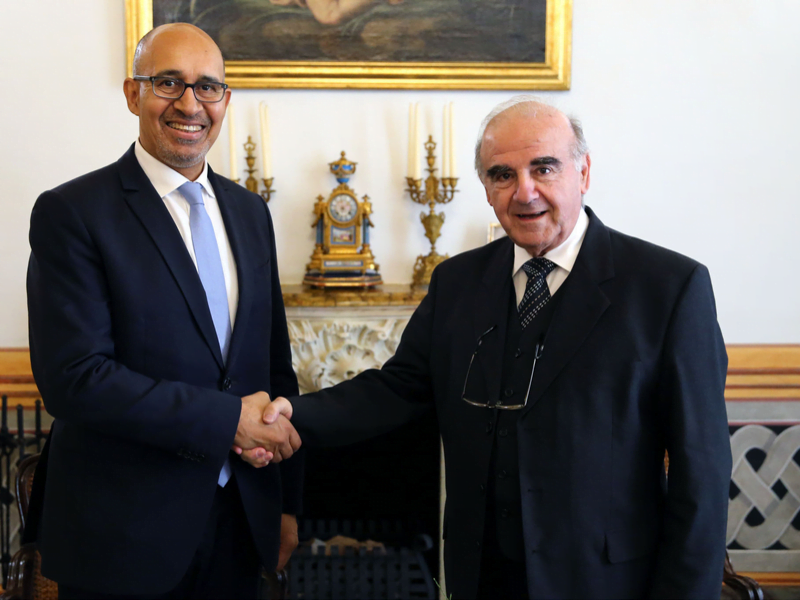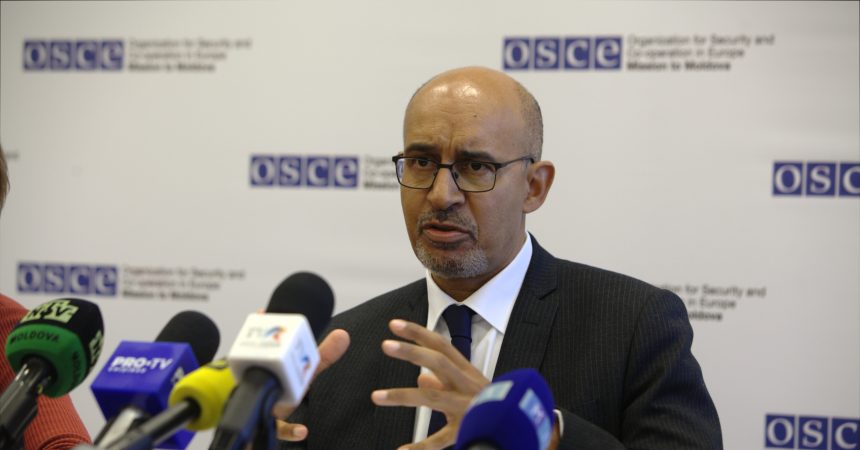There can be no mercy for those responsible for the assassination of Daphne Caruana Galizia, the OSCE Representative on Freedom of the Media Harlem Désir tells The Shift. He is visiting Malta “to pay tribute to her memory and to her legacy” two years since her assassination on 16 October 2017.
He met Prime Minister Joseph Muscat when he visited Malta to attend Caruana Galizia’s funeral. Since then, he has insisted with the Maltese authorities that they must ensure “a full, transparent and independent investigation” and meet their commitments to ensure media freedom, issues he will raise in meetings with the government.
The former French Minister for European Affairs was also a Member of the European Parliament for three consecutive terms from 1999 to 2014. Speaking to Caroline Muscat, he stresses the importance of defending press freedom and defending the public’s right to know. He will be addressing a press conference on 15 October at the launch of the report by Reporters Without Borders and The Shift titled Justice Delayed: The Assassination of Daphne Caruana Galizia and Malta’s Deteriorating Press Freedom Climate at the Valletta Campus at 11.30 am.
Why do you feel it’s important to visit Malta on the two-year anniversary of Daphne Caruana Galizia’s death?
The murder of Daphne Caruana Galizia was an immense shock in Malta but also for many around the world. She was killed because she was an independent and free journalist. I am here to pay tribute to her memory and to her legacy.
I am impressed by all the issues she investigated and by her courage. Her murder is a crime against free press and democracy. The most important thing now for me, as for all of us, is to end impunity by bringing justice to this heinous crime.
The safety of journalists everywhere in Europe and in the OSCE region is at stake each time an attack against a journalist remains unpunished. We need to know who was behind the murder of Daphne Caruana Galizia. This is why I am also here to meet with the government and to discuss their efforts in bringing forth justice.
I have repeatedly called for an independent and effective investigation, in order for all the facts to be brought to light and for all those responsible, including masterminds, to face justice. This is will be high on the agenda of my meetings.
The investigation into her death has been criticised by international bodies, including the Parliamentary Assembly of the Council of Europe (PACE). What are your views on this?
Two years ago, and at every occasion since, I have asked the Maltese authorities to ensure that a full, transparent and independent investigation is carried out, and to put in place all necessary means to identify all those who organised this crime. No stone must be left unturned in the investigation until the people behind this murder face justice. There can be no mercy for those responsible for the assassination of the journalist. We need the investigation to yield results. I continue to closely monitor all developments relating to this murder, and I stand ready to assist the authorities in this regard.

The Representative on Freedom of the Media of the Organisation for Security and Cooperation (OSCE) in Europe, Harlem Désir with the President of Malta George Vella. Photo: DOI / Reuben Piscopo
PACE has been critical of the terms of reference and the members of the Board of Inquiry appointed by the Prime Minister. Last week, Special Rapporteur Pieter Omzigt questioned whether there could ever be justice for Daphne. Do you share Mr Omtzigt’s concerns?
I support the establishment of an independent public inquiry as demanded by PACE. I am here to assist Malta, as an OSCE participating State, to ensure that the authorities abide by their media freedom commitments, which includes the safety of journalists and the fight against impunity, and to encourage them to take all necessary initiatives to this end.
I took note of the important step taken by the Maltese authorities in launching a public inquiry into the death of Daphne Caruana Galizia. I also emphasised, however, that the inquiry must be fully independent in order to bring justice for her family, colleagues and the whole of Maltese society. I will discuss this public inquiry and its composition with the authorities during my official visit to Malta and will continue to closely monitor developments and the judicial process.
You have recently stated that attacks against the press have reached an alarming rate. Is there a common thread in the countries where journalists are killed for their work? What can be done, in concrete terms, to tackle this problem?
Unfortunately, it seems to me, that the common thread in all these attacks is the alarming statistic that in 85% of cases during the past 25 years in the OSCE region, the perpetrators or masterminds of these crimes go unpunished. We must also remember that, before they were killed, the targeted journalists had been receiving threats, as was the case with Daphne Caruana Galizia.
These threats are often not thoroughly investigated or are ignored altogether, mistakenly treated as a natural part of the journalistic profession. The fact that the role of the media in democracy is now being questioned or is no longer accepted by many people is fostering such indifference and putting even more journalists at risk. If we want things to change, we must stand up for the safety of journalists.
We should remember that we do not just stand up only for the protection of a profession or some person, but for our right to be informed and to be able to hold those in power to account. I see troubling developments and an overall deterioration of media freedom in too many countries. I am constantly raising my voice on violations of the international commitments to media freedom and freedom of expression of the States.
These problems can only be tackled through genuine political will. Most recently the OSCE participating States adopted a Ministerial Council Decision signed by all foreign ministers of the 57 participating States on the safety of journalists. It must be implemented in all dimensions, protection of the physical but also of the legal safety. Without genuine political will, these commitments will only be as withstanding as the paper they are written on.














